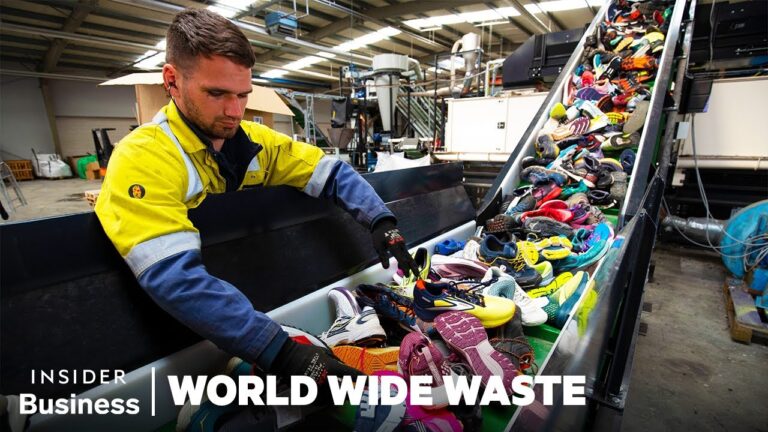Introduction
The global footwear industry, with its massive production volumes and intricate supply chains, has long grappled with the challenge of managing and minimizing waste. In recent years, major shoemakers have increasingly recognized the importance of adopting sustainable practices to address environmental concerns. This article delves into the extensive strategies employed by some of the industry’s giants in dealing with waste, emphasizing their recycling initiatives.
Nike: Pioneering Recycling and Circular Economy Models
As one of the most prominent players in the athletic footwear industry, Nike has taken substantial steps towards minimizing its environmental impact. One of its pioneering initiatives is the “Reuse-A-Shoe” program, launched in the early 1990s. This program encourages consumers to drop off old athletic shoes at designated locations, which Nike then transforms into material used for sports surfaces and new products. By reimagining the lifecycle of their products, Nike has actively contributed to reducing the amount of shoe waste destined for landfills.
Additionally, Nike has embraced circular economy principles through its “Move to Zero” initiative, which seeks to move towards zero carbon and zero waste. The company has committed to using more sustainable materials, such as recycled polyester and rubber, in its products. The “Space Hippie” collection is a testament to this commitment, featuring shoes made from recycled materials, including recycled plastic bottles and factory scraps.
Adidas: Closed-Loop Systems and Innovative Designs
Adidas, another heavyweight in the athletic footwear industry, has set ambitious sustainability goals. The company aims to use only recycled polyester in its products by 2024, highlighting its dedication to reducing dependence on virgin resources. Adidas has implemented closed-loop recycling systems like “Sport Infinity,” where old products are transformed into new ones, promoting a circular economy approach.
The “Futurecraft.Loop” is a flagship example of Adidas’ commitment to sustainable design. This fully recyclable shoe, made from a single material, can be returned to Adidas after use. The returned shoes are then ground down to create the material for new pairs, effectively closing the loop and reducing the environmental impact associated with footwear production.
Asics: Sound Mind, Sound Body Sustainability Plan
Asics, while not as large as Nike or Adidas, has been proactive in its pursuit of sustainable practices. The company’s “Sound Mind, Sound Body” sustainability plan outlines its commitment to addressing environmental challenges, including waste reduction. Asics aims to use 100% sustainable materials in its products by 2030, focusing on circular economy principles and responsible material sourcing.
The company actively explores ways to extend the lifespan of its products, promote recycling, and minimize the use of virgin resources in its supply chain. By incorporating recycled materials and emphasizing durability, Asics aims to create a more sustainable and responsible approach to athletic footwear.
Puma: The Puma InCycle Collection
Puma, another major player in the athletic footwear industry, has introduced the “Puma InCycle” collection, showcasing its commitment to sustainability. This collection features products made from recyclable and biodegradable materials, emphasizing the importance of responsible material choices in reducing environmental impact.
New Balance: Commitment to Sustainable Practices
New Balance, a renowned athletic footwear manufacturer, has been making significant strides in incorporating sustainable practices into its operations. The company emphasizes responsible sourcing of materials and has introduced the “New Balance Recycled” collection. This collection features shoes made from recycled polyester, reducing the environmental impact associated with virgin material production. New Balance also focuses on reducing waste in its manufacturing processes, contributing to a more sustainable approach to footwear production.
Reebok: Eco-Friendly Initiatives
Reebok, a subsidiary of Adidas, has also been actively pursuing eco-friendly initiatives. The brand introduced the “Cotton + Corn” collection, featuring shoes made from sustainable materials like cotton and corn. Reebok is committed to using more environmentally friendly materials in its products and has set goals to increase the use of recycled polyester in its footwear. The brand’s emphasis on sustainable materials and responsible manufacturing aligns with the broader industry shift towards eco-conscious practices.
Converse: Renew Collection and Recycling Efforts
Converse, a subsidiary of Nike, has made strides in sustainability with its “Renew” collection. This collection incorporates recycled materials, including recycled polyester and recycled cotton, in the manufacturing of its iconic Chuck Taylor sneakers. Additionally, Converse has joined Nike’s “Reuse-A-Shoe” program, encouraging consumers to drop off old shoes at designated locations for recycling. By actively participating in recycling initiatives, Converse contributes to the reduction of shoe waste and promotes a more circular approach to footwear production.
Ecco: Sustainable Leather and Biomaterials
Ecco, a Danish footwear company known for its high-quality leather shoes, has taken a sustainable approach to its production processes. The company places a strong emphasis on responsible leather sourcing and has introduced innovative biomaterials in its designs. Ecco’s commitment to sustainable practices includes reducing water consumption in tanning processes and exploring alternative materials that have a lower environmental impact. By prioritizing both material choices and manufacturing processes, Ecco contributes to a more sustainable and environmentally friendly footwear industry.
Veja: Ethical and Sustainable Footwear
Veja, a French footwear brand, has gained recognition for its commitment to ethical and sustainable practices. The company focuses on transparency throughout its supply chain, sourcing materials like organic cotton and natural rubber. Veja’s innovative approach involves creating shoes with minimal environmental impact, from sourcing to production. The brand actively avoids harmful chemicals and incorporates eco-friendly materials, catering to a growing consumer demand for sustainable and ethically produced footwear.
Salomon: Outdoor Footwear with Sustainability in Mind
Salomon, known for its outdoor and sports footwear, has integrated sustainability into its product design and manufacturing processes. The brand utilizes recycled materials in some of its products, such as recycled polyester and rubber. Salomon also emphasizes durability and longevity in its designs, encouraging consumers to invest in high-quality products that have a reduced environmental footprint over time. By combining performance with sustainability, Salomon contributes to the broader movement for eco-friendly outdoor footwear.
Collaborative Initiatives:
Several major shoemakers are also participating in collaborative initiatives that promote sustainability across the industry. The Sustainable Apparel Coalition (SAC) is a prime example, bringing together major brands, including Nike and Adidas, to work towards common goals. SAC has developed the Higg Index, a tool that helps companies measure and improve their environmental and social performance throughout the supply chain.
Challenges and Opportunities
While these major shoemakers have made commendable progress in sustainable practices, challenges persist. The transition to a fully circular economy for footwear faces hurdles related to technology, infrastructure, and consumer behavior. The cost of implementing sustainable practices can also be a barrier for some companies, but the long-term benefits in terms of brand reputation and environmental stewardship outweigh the initial investments.
Conclusion
The major shoemakers in the industry are undeniably taking significant strides towards sustainability, recognizing the urgent need to address environmental concerns. Through recycling initiatives, closed-loop systems, and innovative design approaches, companies like Nike, Adidas, Asics, and Puma are reshaping the landscape of the athletic footwear industry. As they continue to pioneer new sustainable models and inspire consumer awareness, the prospect of a more eco-friendly future for footwear becomes increasingly promising. The commitment of these major players sends a powerful message that sustainability is not just a trend but a fundamental responsibility for the industry as a whole.


